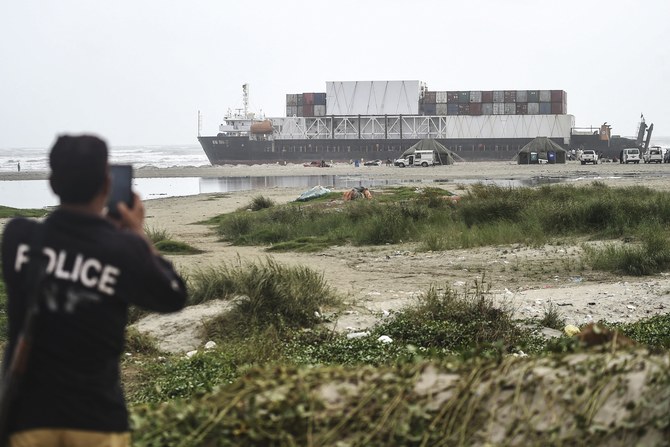KARACHI: Pakistani Prime Minister Imran Khan's aide on maritime affairs said on Tuesday they had rescued a giant cargo ship that remained stuck off the coast of Karachi for almost 50 days.
MV Heng Tong 77, a cargo ship with a capacity of 3,600 dead weight tonnage, anchored in Pakistan’s territorial waters for a crew change on way to Turkey from China, when it lost its anchors due to extreme weather and drifted towards shallow waters on July 18.
It had since been stuck off the Karachi coast, with Pakistani authorities offloading 118 tons of bunker fuel from the vessel, fearing any spills could pollute the seawater.
“The ship is now moved to the safe waters in open sea,” Mahmood Moulvi, PM Khan's special assistant on maritime affairs, told reporters in Karachi.
“This is the first ship rescued safe and sound as opposed to the past, when such ships would be rescued by cutting them into pieces.”
He said the cargo vessel would be "detained" at the harbor and allowed to depart only after complete inspection and ensuring its operability by the Mercantile Marine Department (MMD) of the Pakistani Maritime Affairs Ministry.
“The ship will be allowed to sail away from Pakistan after it is ensured that it is technically fit,” the PM's aide said. “The owner of the ship would be responsible to satisfy the MMD about technical fitness of the ship.”
He said surveyors would also check navigation equipment of the vessel and its engines before allowing the Panama flag-carrier to sail away.
Officials had estimated operational expenses to rescue MV Heng Tong 77 at $2 million, but a local firm tasked with removing the ship from sand did the job for one fourth of the estimated cost, according to Moulvi. All these operational expenses would be incurred by the owner of the ship.

















